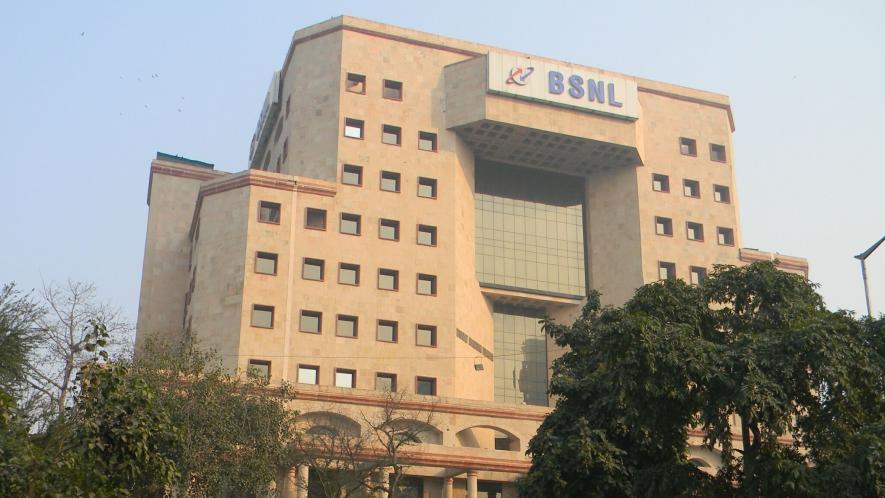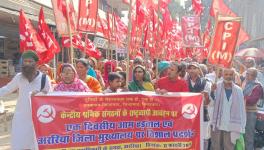Demanding 4G Service and ‘Revival’ of Company, BSNL Employees to Join General Strike

Image Courtesy: Wikimedia Commons
Reiterating the anger over delay in launching of 4G services in the state-owned Bharat Sanchar Nigam Limited (BSNL), its employees’ union leader P Abhimanyu on Wednesday said that eight unions and associations of the telecom service provider will be joining the general strike on November 26 to protest against the “insincere” attitude of the Centre.
Ten Central Trade Unions last month gave a nationwide call to observe one-day general strike on November 26 in protest against the recent policy decisions of the Narendra Modi-led government. The call had come in the wake of a spate of demonstrations raging across the country by farmers, workers and employees in public sector enterprises.
A statement dated November 17, signed by BSNL unions participating in the strike, accused the Centre of “weakening” the public telecom service provider. They termed it a part of the government’s “overall strategy to wipe out the Indian Public Sector.”
“The Revival of BSNL still remains a distant dream, since the government is not taking sincere steps for the same. Not only that, the [central] government is also creating roadblocks in BSNL’s 4G launching,” the statement said.
The BSNL is also the company that is currently “playing the role of a regulator” in the telecom sector. Its existence is hindering the private companies from raising their call and data charges, Abhimanyu, general secretary of BSNL Employees’ Union (BSNLEU), told Newsclick in an interview.
“TRAI (Telecom Regulatory Authority of India) is the (statutory) regulator, but it is hand in glove with [Reliance] Jio… and hence, it is BSNL that is actually playing the role of the regulator [in the telecom sector],” he alleged, adding that if the latter gets shut down (or privatised), then there will be nothing stopping the private telecom providers in the country from “forming a cartel and fleece customers’ money.”
Since the launch of its commercial services in September 2016, Jio, a subsidiary of Mukesh Ambani’s Reliance Industries, has often being seen as a game-changer in the telecom market, but for infamous reasons. From predatory pricing to taking alleged undue advantages from the Centre, the Jio business model has been accused of hurting all the players in the telecom sector.
“Look at Videocon, Aircel, Telenor, Tata Tele Services … all these companies have been closed down because of the onslaught of the predatory pricing unleashed by Jio. Even Airtel and Vodafone, which are giants and behemoths [in the telecom sector], ran into losses,” Abhimanyu said, adding that as such BSNL was not left unaffected.
He informed that post 2016, the revenue collections for BSNL slumped, because of which it went into a financial crisis. In March 2019, it was reported that for the first time, salaries of over 1.68 lakh employees at BSNL were delayed even as the contract workers in many district circles were not paid for over 10 months.
Having contended that BSNL is going through tough times, Abhimanyu stressed that the financial health of the state-owned telecom company is crucial for the sector. It is so, according to him, because BSNL is the only company operating currently in the telecom sector that is capable of putting up a tough competition to Jio. “The over-zealous ambition to monopolise the telecom sector will not happen [as long as BSNL exists] and that is why it is being weakened from within,” Abhimanyu said.
“BSNL is currently having a very serious cash crunch. It doesn’t have the cash flow to improve the quality of even its existing telecom services,” Abhimanyu rued, adding that for any revival, revenue generation is crucial. In the case of BSNL, that is possible only if 4G services are launched.
Hence, the employees who will be striking are demanding the immediate launch of 4G services and putting a stop to “indiscriminate outsourcing” of work, among other things.
It is not as if the Centre didn’t know the importance of BSNL’s revival. A much-extolled relief package worth Rs 69,000 crore was announced last year to turnaround the cash-strapped BSNL and MTNL (Mahanagar Telephone Nigam Limited). The package included rolling out the 4G services.
However, the revival package is “yet to see the light of day”, except for the implementation of the Voluntary Retirement Scheme (VRS), which saw trimming of almost half of BSNL’s workforce.
According to Abhimanyu, this is not the first time when BSNL is being disallowed to adopt higher technologies. “From 2007 to 2012, this was done by the [Congress-led] UPA government as well, which did not allow BSNL to procure mobile equipment then. For five-six years, we conducted strike after strike and then succeeded only in 2013… when the damage was already done,” he said.
The BSNL employees striking work on November 26 have also extended their support to the seven-point demand charter of the Central Trade Unions, which includes a cash transfer of Rs. 7,500 to all non-income tax payee families. Asked why it is crucial to raise these demands, Abhimanyu said, “We cannot worry only for our demands and well-being. BSNL workers are part and parcel of the Indian working class… and in that way, BSNL employees’ union is a patriotic organisation.”
Get the latest reports & analysis with people's perspective on Protests, movements & deep analytical videos, discussions of the current affairs in your Telegram app. Subscribe to NewsClick's Telegram channel & get Real-Time updates on stories, as they get published on our website.
























